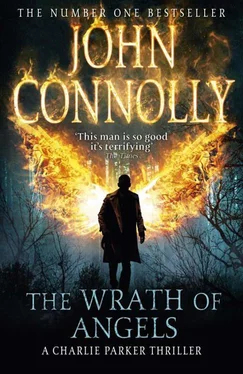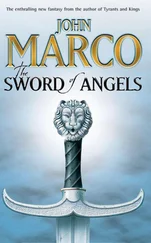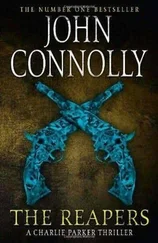After riding for three hours, during which time Buckingham believed they were always under the eyes, and potentially the knives, of the Abenaki, they were met by a heavily armed party of natives, who quickly surrounded the two men. The leader gave his name as Tomah, or Thomas. He wore a cross at his neck, and had been baptized into the Catholic faith by French missionaries, accepting Thomas as his baptismal name. Buckingham was not sure what troubled him more: that he was surrounded by Abenaki, or surrounded by Catholics. Nevertheless, he and Tomah sat down together, and, with Woolman acting as translator, the Abenaki told them of what had transpired at the fort.
Most of what was said did not pass into the official record. Buckingham’s report on what came to be termed ‘the incident at Fort Mordant’ stated only that a dispute of unknown origin arose there, possibly fueled by alcohol, which led to the deaths of the entire garrison, including its commander, Captain Holcroft, and his wife. The role played by the Abenaki in Holcroft’s murder became clear only when Woolman’s private diary was discovered after his death, but Woolman also glossed over much of what was disclosed by Tomah, apparently by mutual agreement with Buckingham. Neverthelesss, the contents of Woolman’s diary went some way toward explaining why Buckingham allowed the killing of a fellow officer by the Abenaki to go both unreported and unpunished. Buckingham was a professional soldier, and he understood that, sometimes, a lie was preferable to a truth that might tarnish the reputation of his beloved army.
Woolman’s diary revealed a few pertinent details. The first was that Holcroft had been discovered by the Abenaki while apparently hunting his own daughter, but despite the Abenaki’s own efforts, and a further search by Buckingham and his men, the girl was never found. Second, the Catholic Abenaki told Woolman they had set out to kill the inhabitants of the fort in reprisal for the earlier slaughter. The small band of warriors who had been willing to overcome their fear of the territory were all Catholic converts, although they were additionally armed with totems of their tribe. They arrived at the fort to find that the soldiers had done the job for them, and had to be content with taking their revenge on Holcroft alone, whom Tomah described by using the same word that Woolman had used when Buckingham first met him: majigek .
Finally, according to Woolman, the Abenaki claimed that, before he died, Holcroft came to his senses, and begged his tormentors for forgiveness for what he had done. Woolman admitted that he had trouble understanding Tomah’s description of Holcroft’s final words, and was forced to clarify them in halting French, to little avail. Holcroft, it seemed, had railed in English, of which Tomah knew little; in French, of which Tomah knew slightly more; and in some mishmash of Passamaquoddy and Abenaki that Holcroft had picked up during his postings in the region, for like Mordant himself he was known to be a scholar of languages, and a civilized man.
As Woolman understood it, Holcroft claimed to have committed the slaughter of the Abenaki on the orders of the tsesuna , the Raven God who pecked at his window. He also termed him the apockoli , the Upsidedown God who spoke to him from behind his shaving mirror, and who sometimes called to him from the depths of the forest, his voice bubbling up from deep beneath the earth. It was this same entity, this demon, who had infected his men with madness, and turned them upon one another.
Holcroft had used another word too in connection with him before the Abenaki set to torturing him: it was ktahkomikey , a word that referred to wasps, particularly a certain species that nested in the ground.
Holcroft had died screaming of the God of Wasps.
45
Outside the Cronin home, I rested The Gazetteer against the steering wheel while I tried to figure out the journey taken by Harlan Vetters and Paul Scollay on the day they found the plane. Marielle Vetters had told me that her father believed he and his friend had tracked the deer for four hours or more, traveling northwest or north-northwest for the most part, as best they could tell. There was a logging road that ran north from Falls End. It was the one Phineas had used on his illegal bear-hunting trip, and it seemed the most likely route for Vetters and Scollay to have taken as well. It veered northeast after ten miles, as though the road had been specifically designed to discourage anyone from venturing farther northwest: where the road altered direction was probably the closest point to Fort Mordant. From there, we’d move into the forest on foot. I had considered the possibility of using ATVs, but they were cumbersome to transport, and also noisy, and we were not the only ones looking for that plane. The sound of four ATVs moving through the woods might well be enough to get us killed.
I was so lost in the map, as though I were already deep in those woods, that the ringing of my phone came as an unwelcome distraction, and I didn’t even glance at the number before I picked it up. It was only when I had pressed the green button that I thought again of the message I had left on Marielle Vetters’ answering machine, and the possibility that the police might have listened to it, but by then it was too late.
Thankfully, it was only Epstein on the other end. He was calling from Toronto. I could hear traffic in the background, and then Epstein’s words were overcome by the roar of a jet.
‘You’ll have to repeat that,’ I said. ‘I couldn’t hear you.’
This time, I heard him clearly.
‘I said, “I know who was the passenger on that plane.”’
Wildon’s widow remembered Epstein. They had met once before, she said, at an event to raise funds for the collection of DNA from Holocaust survivors so that the separated members of families might be reunited, and anonymous remains identified, an initiative that eventually became part of the DNA Shoah Project. It was the first time that Wildon and Epstein had come face to face, although each knew of the other’s work. Eleanor Wildon recalled the two men shaking hands, and that was the last she saw of her husband for the rest of the evening. Epstein, too, remembered that night, but he had forgotten entirely that Wildon’s wife had been present, so pleased was he to meet a kindred spirit.
They were sitting in the drawing room of her apartment, which took up the entire top floor of an expensive condominium in Yorkville. A pair of Andrew Wyeth paintings hung at either side of the marble fireplace: beautiful, tender studies of autumn leaves from his late period. Epstein wondered if, as their lives came to a close, all artists found themselves drawn to images of fall and winter.
Two teacups sat on the table between them. Mrs Wildon had brewed it herself. She lived here alone. She was not a particularly beautiful woman, nor had she ever been. Her features were plain at first glance, her face unremarkable. Had he not been distracted by her husband at their earlier meeting, Epstein would still barely have noted her presence, if he had noted it at all. Even here, in her own home, she seemed to blend into the furniture, the wallpaper, the drapes. The pattern on her dress echoed the textures and colors of the fabrics, rendering a chameleon quality to her. It was only later, when he had already left her, that Epstein understood this was a woman who was hiding herself.
‘He thought very highly of you,’ said Mrs Wildon. ‘He came back that evening more animated than I’d seen him in years. I thought it was all foolishness, his stories about angels, his fascination with the End Times. It wasn’t harmless, because it was too odd for that, but I tolerated it. All men have their eccentricities, don’t they? Women too, I suppose, but men’s are more ingrained: it’s something to do with their boyishness, I think. They hold onto the enthusiasm of childhood.’
Читать дальше












